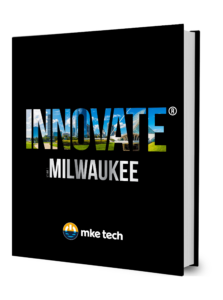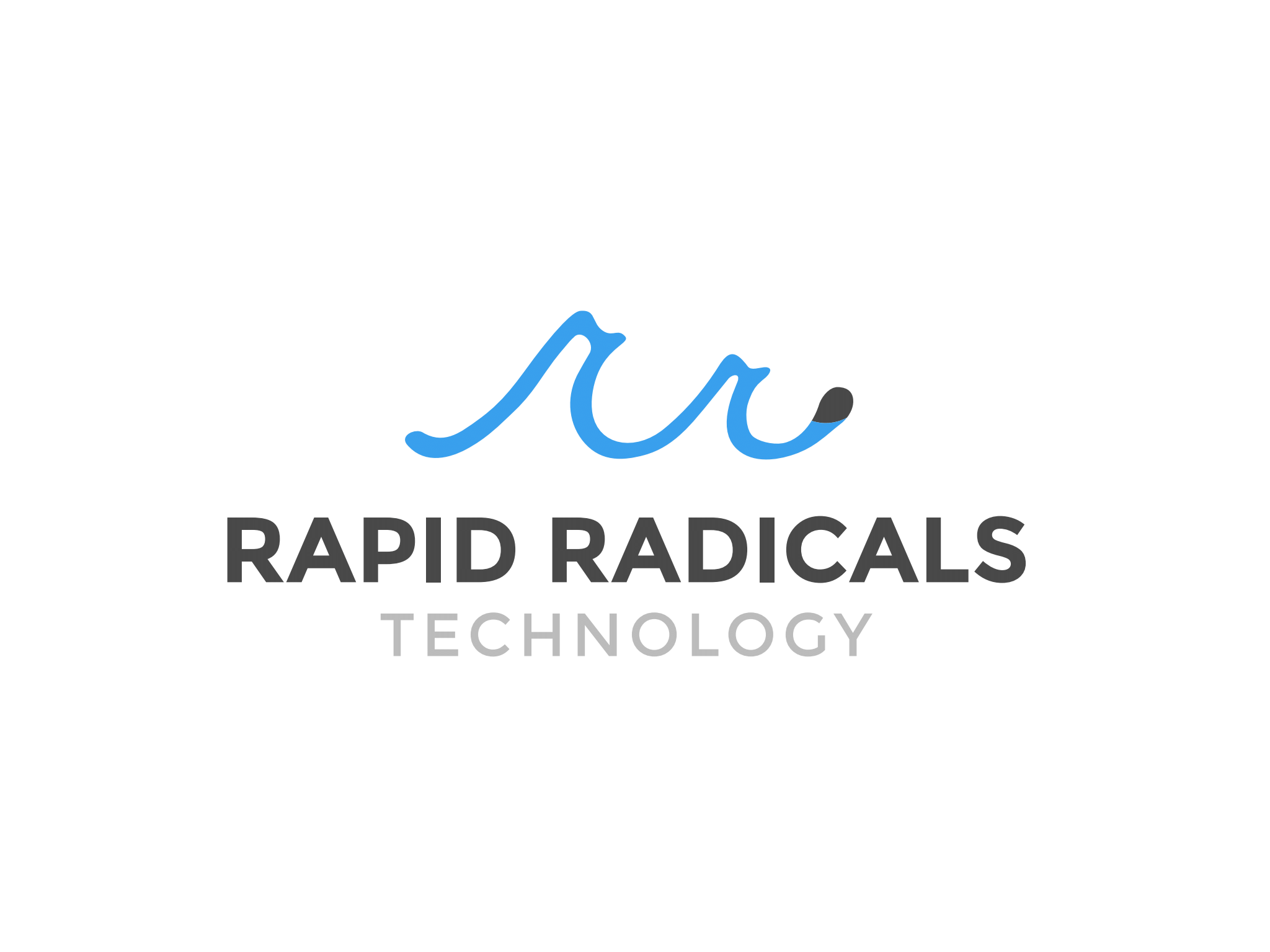In July 2010, nine inches of rain fell in a very short amount of time, filling the Milwaukee Metropolitan Sewerage District’s (MMSD) service area pipes with some 64 billion gallons of water. A storm of this severity is only likely to occur once every 500 years, but the frequency is increasing as a result of our changing climate.
At the core of innovation, where challenges meet breakthroughs, stands Rapid Radicals Technology Inc., a showcase of resilience and ingenuity. Born from the minds of two eager engineers to solve a problem that threatened the livelihoods of thousands of families, Rapid Radicals was started to solve the sewer overflow problem in the aftermath of a devastating storm, with this pioneering enterprise embodying the spirit of overcoming adversity through relentless innovation.
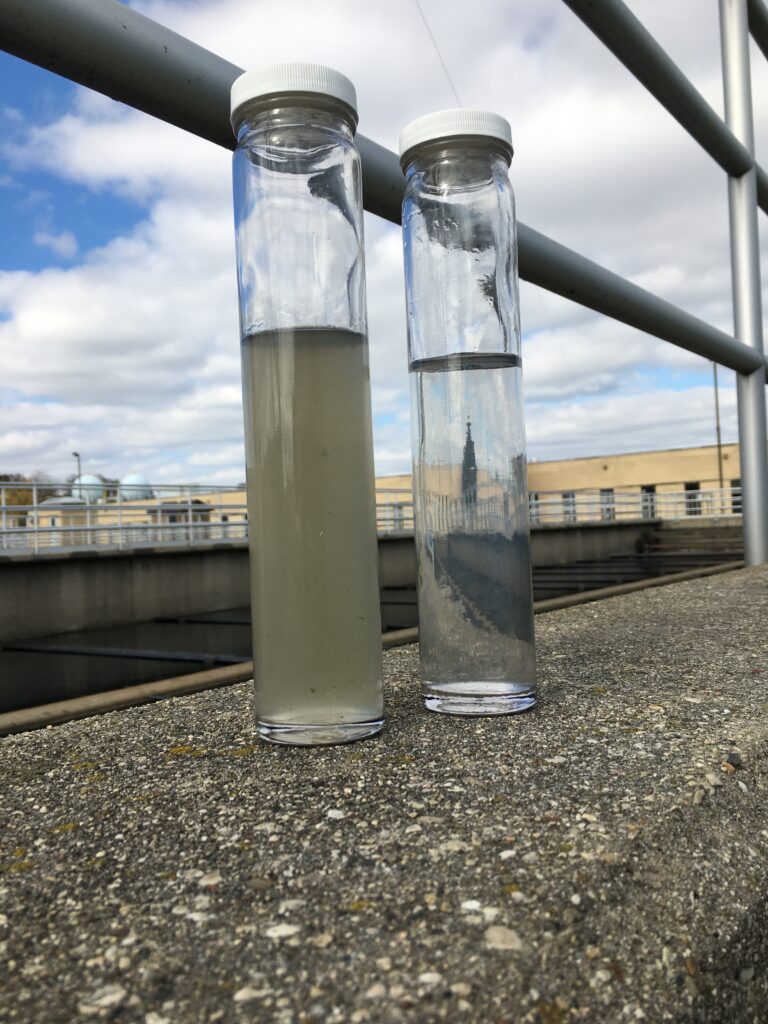
Defeating Disaster
“Over 4,000 homes were flooded with combined stormwater and wastewater and over two billion gallons of untreated sewage were discharged into Lake Michigan,” recounts Dr. Paige Peters, Founder and CTO of Rapid Radicals. Recognizing that this intense rain event, which will only become more intense and frequent, overwhelmed MMSD’s combined sewer system and overburdened conventional wastewater treatment.
Dr. Peters began her Master’s Degree at Marquette University in 2015, where Dr. Dan Zitomer served as her research advisor. After Dr. Zitomer’s basement flooded during the 2010 storm, he realized that there must be some engineering solution to treat wastewater faster than conventional treatment to avoid untreated sewage flooding people’s homes and/or being discharged into lakes and rivers. The idea for the core technology behind the Torrent3 Treatment System was born, and together, the two began the research and development work to make the idea a reality.
Genesis of Genius
The fully automated system consists of rapid solids removal followed by a proprietary ozone-based advanced oxidation process. The process can remove organics and disinfect harmful bacteria and viruses in 25 minutes compared to 8-14 hours for conventional treatment. Unlike conventional treatment, Torrent3 can also remove persistent micropollutants, contaminants of emerging concern, and treat wastewater for indirect water reuse. While scaling the technology as her Master’s and then PhD research, Dr. Peters founded Rapid Radicals Technology in 2016 to commercialize the Torrent3. Between 2016 and 2022, Rapid Radicals worked with the MMSD and Marquette University to construct and pilot the Torrent3 at three different scales while building the business and determining the market fit.
Their brainchild emerged not merely as an invention but as a promise to safeguard communities against the inevitable, and it is a testament to the company’s commitment to excellence and environmental stewardship.
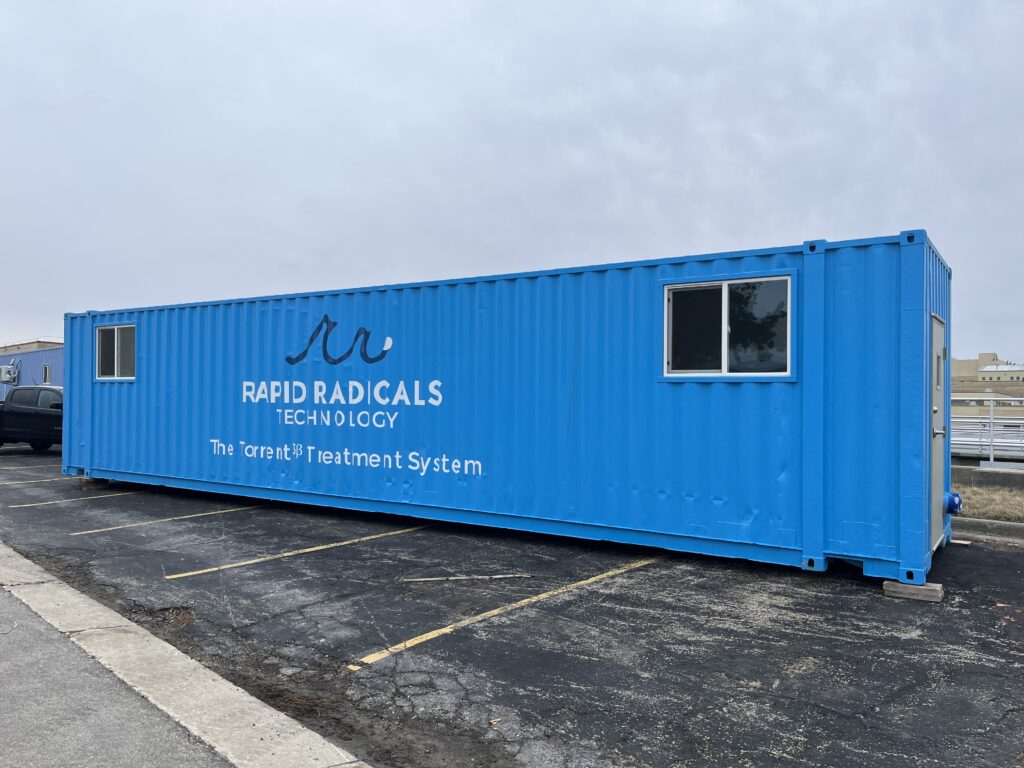
The Pillars of Innovation
What does innovation mean to Dr. Peters and Rapid Radicals? “At Rapid Radicals, innovation is not just about being pioneers in novel technology development, but also in the way that we approach problem-solving,” she elucidates. “We’re obsessed with market research and customer discovery and are iteratively building a technology focused on solving a problem – not just providing a solution. We are a very small, lean team working on a very complicated, deep technology. Still, we are committed to staying small and intentional so we can engage the communities whose problems we’re solving.”
Innovation at Rapid Radicals is also about understanding the pulse of the market, iterating solutions that address real-world problems, and, most importantly, introducing a technological breakthrough that revolutionizes wastewater treatment.
Will Schanen, COO, explains their strategic approach to technology development, emphasizing, “It is critical that our technology responds to actual market needs, rather than our assumptions on what the market wants. Through rigorous market research, we continue to ensure that we are not pushing our technology on the market but allowing the market to tell us where there are problems or gaps that customers are willing to pay to resolve.”
The Pillars of Success
Central to Rapid Radicals’ ethos are three innovative principles that guide their operations: market sensitivity, iterative development, and technological innovation. Dr. Peters highlights their focus on solving real, immediate problems through extensive market research. They embrace an iterative approach, transitioning from lab-scale research to real-world applications to refine their technology, which pilot studies for scalability have validated. Their technological edge lies in combining rapid solids removal with advanced oxidation, a novel approach in wet weather scenarios that significantly enhances water treatment efficiency, promising at least a 30% improvement. The synergy of the two processes not only enhances efficiency but also paves the way for sustainable urban water management.
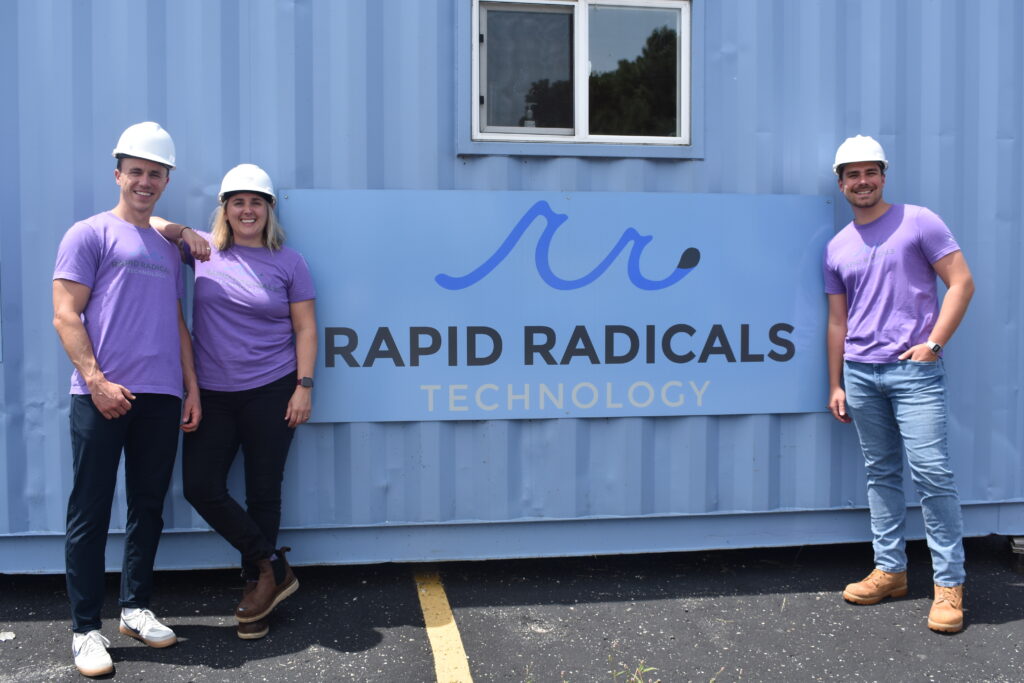
Forging Partnerships, Fostering Growth
The trajectory of Rapid Radicals’ growth is a narrative of strategic alliances and supportive ecosystems. From the invaluable mentorship of the MMSD to the financial backing of the National Science Foundation, to the SBIR Advanced Matching Grant, support from the UW Extension and the WEDC, Wisconsin Technology Council, The Water Council and its BREW Accelerator, and Imagine H20’s Accelerator and Urban Water Challenge, these partnerships have been instrumental in catapulting the Torrent3 Treatment System from concept to reality.
“It’s the support of local organizations and our partnerships that have gotten us to where we are today and will continue to support us as we grow,” Dr. Peters shares. “Innovating in water technology is a challenge, and it requires this sort of ecosystem to thrive. We’re grateful to have the opportunity to develop our technology here and are optimistic for a future where our technology gives back by contributing to water challenges, locally and globally.”
Thank you to MKE Tech for making this book possible, they are the voice and champion of Innovate® Milwaukee that unifies the community!

“Innovation is not just about being pioneers in novel technology development, but also in the way that we approach problem-solving.”
Forging Partnerships, Fostering Growth
The trajectory of Rapid Radicals’ growth is a narrative of strategic alliances and supportive ecosystems. From the invaluable mentorship of the MMSD to the financial backing of the National Science Foundation, to the SBIR Advanced Matching Grant, support from the UW Extension and the WEDC, Wisconsin Technology Council, The Water Council and its BREW Accelerator, and Imagine H20’s Accelerator and Urban Water Challenge, these partnerships have been instrumental in catapulting the Torrent3 Treatment System from concept to reality.
“It’s the support of local organizations and our partnerships that have gotten us to where we are today and will continue to support us as we grow,” Dr. Peters shares. “Innovating in water technology is a challenge, and it requires this sort of ecosystem to thrive. We’re grateful to have the opportunity to develop our technology here and are optimistic for a future where our technology gives back by contributing to water challenges, locally and globally.”
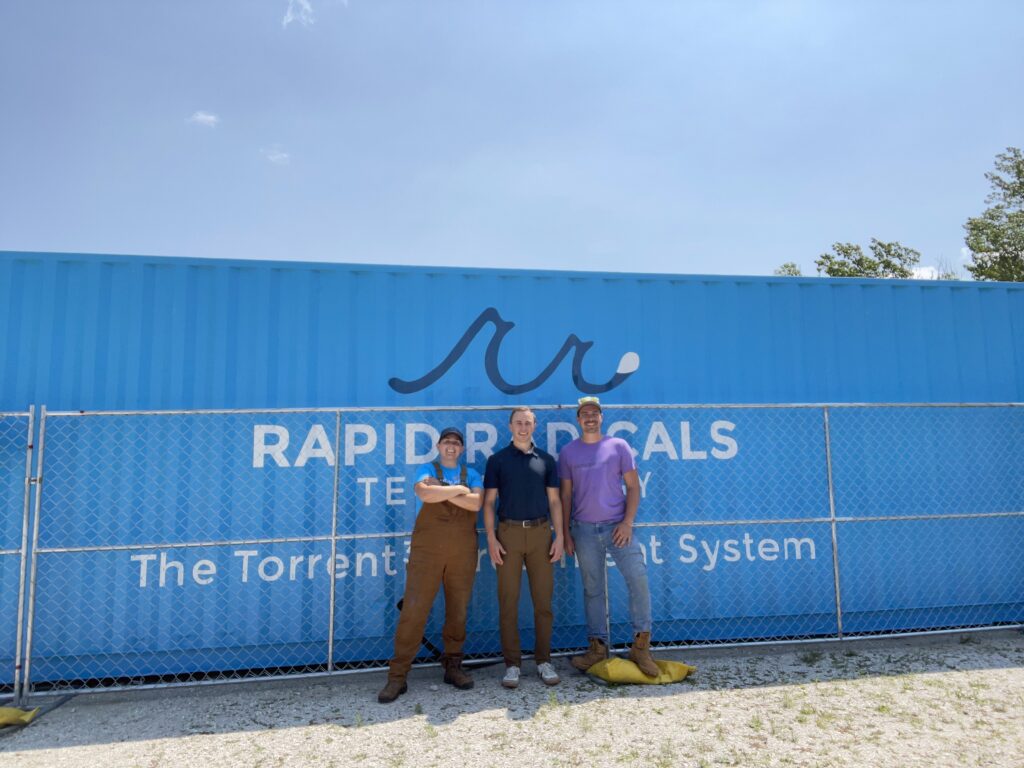
Envisioning a Resilient Tomorrow
Looking ahead, Rapid Radicals Technology Inc. is not just about confronting today’s challenges; it’s about shaping a future where communities are insulated from the caprices of climate change. Their technology is more than a solution – it’s a beacon of hope for cities worldwide, promising cleaner water and safer homes, rain or shine. “Water challenges are complex and require innovative solutions to manage them, especially as they increase and change over the next decade-plus,” Rapid Radicals CEO, Dylan Waldhuetter elucidates. “We’re confident that we’re an important piece of that puzzle and are excited to see our technology solving those problems into the future.”
A Message of Optimism and Urgency
As Rapid Radicals continues to evolve, its journey is a clarion call to innovators everywhere. In the face of daunting environmental challenges, their story reminds us that with determination, collaboration, and a forward-thinking mindset, we can turn the tide, ensuring a sustainable and resilient future for all.

